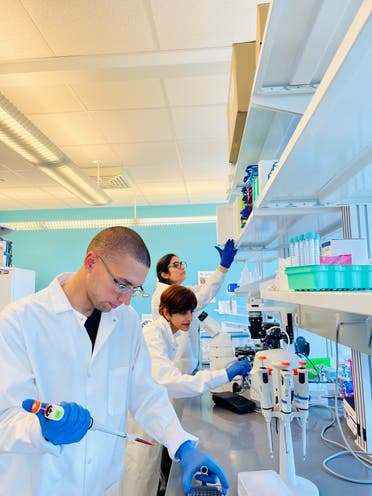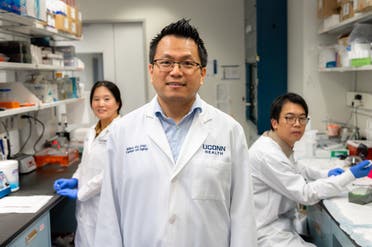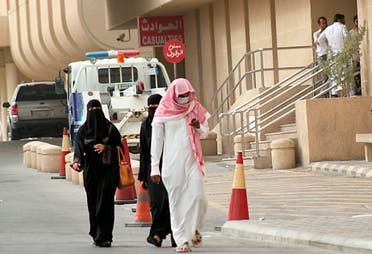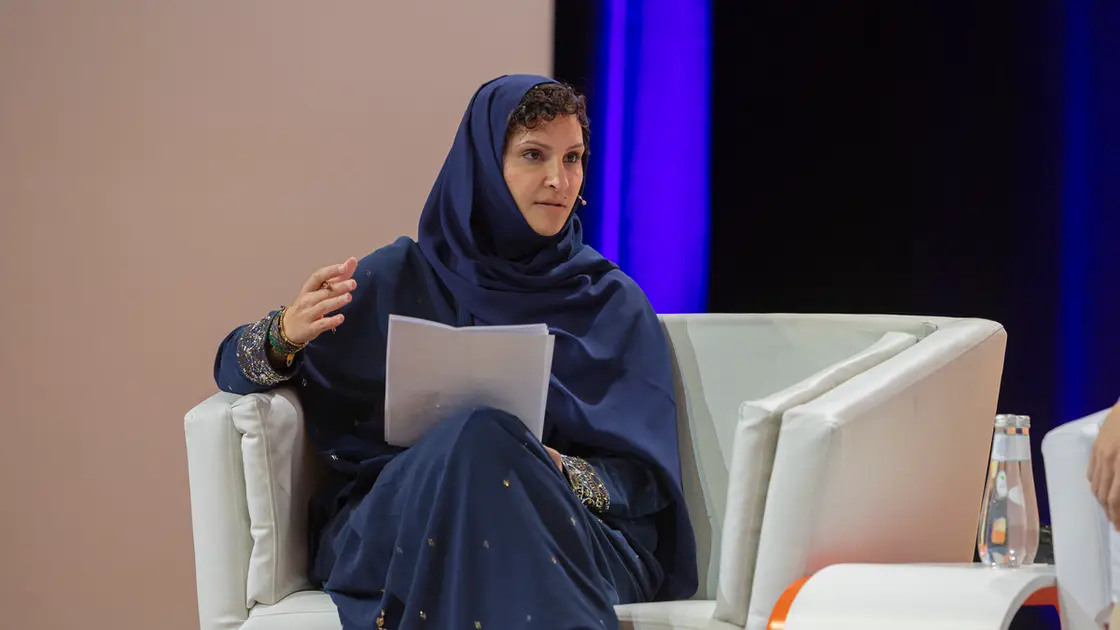Four years ago, by royal decree, Saudi Arabia’s Crown Prince Mohammed bin Salman pledged a vast financial investment – over a billion dollars a year – into research that would extend the healthy human lifespan, which led to the birth of the Kingdom’s Evolution Foundation.
The Foundation – a global fund that aims to find and invest in innovative ways to “decelerate” the aging process and extend the number of years people live in good health – is heavily invested in academic research and biotech startups that promote longevity by slowing aging and combating age-related diseases.
In an interview with Al Arabiya English, Saudi Princess HRH Dr Haya Bint Khaled bin Bandar al-Saud, Vice President of Organizational Strategy & Development, said she believes the Foundation’s work will see tangible results in decelerating aging in a matter of years.
“We are an organization that’s helping all humanity,” she said, adding that the initiative aims to be the first non-profit to pursue age-related therapeutic breakthroughs. It is committed to funding global scientific discovery and investing in private companies and entrepreneurs dedicated to advancing aging science.
“Hevolution wants to become a convener and to become a catalyst in the field and bridge the gap in the funding in terms of investment and in science, and the Hevolution Foundation has done multiple activities in the past year to ensure that we develop this convening and catalyst platform to move the healthspan science forward for the benefit of all of humanity.”
Dr al-Saud said therapeutics that extend a healthy human lifespan will redefine healthcare in the 21st century.
As of 2023, the non-profit organization has expanded outside the Kingdom’s borders – which houses its Riyadh headquarters – into its first international hub in Boston, Massachusetts. The US office makes it the country’s biggest hub for life sciences. It is eying up a further global hub in the United Kingdom by the end of the year and has plans for an Asia hub.
It has also, in the past 18 months, pledged $200 million for research into anti-aging, longevity biotech and healthy lifespan, a planned investment in two biotech companies, evaluated more than 150 companies across the globe as it eyes funding opportunities, is whittling down more than 500 grant applications from scientists around the world, has published the GCC’s first roadmap in healthy human lifespan, and is gearing to host the Kingdom’s first Global Healthspan Summit in November.
The organization has funded numerous researchers at top-tier institutions, including via a partnership with the American Federation for Aging Research (AFAR), a leading non-profit organization supporting biomedical aging research.
Targeting the root cause of aging
The primary investment focus of the Hevolution Foundation is on early-stage companies developing therapies and technologies that target the root causes of aging.
The Saudi-headquartered Foundation will also invest in platforms and technologies that aim to compress drug development timelines or increase accessibility to therapeutics within the context of extending the healthy human lifespan.
Also speaking with Al Arabiya English, Dr Mehmood Khan, CEO of the Hevolution Foundation, said the “genesis” of the Hevolution Foundation “was to take on a global health challenge which affects every person on the planet – everybody’s aging.” An increased life expectancy is accompanied by increasing disability and diseases that are associated with aging, said Dr Khan.
“And nobody knows that better than the UK NHS, which essentially is crumbling as a result of the disease burden from age-related diseases. The same is true in the US. And as we look at the global challenge, China, Japan, South Korea, with aging populations and now much of the developing world as well, including the increasing prevalence of diabetes, cancer with the young population in the Middle East.”

Dr Khan points out that the average lifespan has grown dramatically since the mid-1800s. However, the average healthy lifespan (the years spent in good health) has hardly increased. Although people live longer, their additional years are usually accompanied by poor health. Most of this disease burden is attributable to age-related, non-communicable diseases (NCDs).
Moreover, many societies worldwide are steadily graying, and elderly populations are swelling (a phenomenon known as the age wave or the silver tsunami) even as birth rates are falling. Aging societies face a future in which older people will noticeably outnumber the working-age population, presenting an unprecedented economic challenge and possibly fueling intergenerational tension. This is already the case in some countries, such as Japan, where 30 percent of the population is 65 or older.
Even beyond public health challenges, population aging will usher in fundamental, society-wide changes needed to accommodate a transformed population structure.
“This [anti-aging research] is one of the most under-invested fields relative to the need. So, we want to balance that out and get all the players up the table, including the private sector,” said Dr Khan.
“So that’s sort of the genesis of Hevolution and its purpose, which is to expand healthy lifespan… and everything we invest in and fund and do has to be democratized, and we are really looking for things that are going to have an impact on as many people in the world as possible – regardless of their location, their gender, their age, and religion, etc.”

But why anti-aging?
With the Saudi Vision 2030, a strategic framework that seeks to diversify the Saudi Arabian economy, Dr Khan, who the Saudi royal family hired to oversee the global Foundation in 2020, said the Hevolution Foundation “perfectly aligns” with the goals of the Kingdom’s blueprint.
He points out that AI and healthcare are at the heart of the 2030 framework. It seeks to boost the country’s image globally by investing in healthcare, education, artificial intelligence, and other projects.
Additionally, three priorities for the goal’s ongoing health reforms are to improve access to healthcare services, to improve the quality and efficiency of the health system, and to strengthen prevention against health threats, all of which are relevant to the healthy aging agenda.
“Vision 2030 clearly lays out two things,” said Dr Khan. “One is the goal to extend the lifespan in the country. Yes, it also aims to prevent chronic diseases and improve the population’s health. When you combine those two parts of Vision 2030 you get the Hevolution Foundation.”
He added: “The consequence of aging is very relevant for the Middle East. Ask any Middle Eastern resident, and there are people who either have diabetes or know somebody who has a loved one who has diabetes, or heart disease.”
“Now, in the region, one of the commonest cancers occurring is colon cancer (which) was almost unheard of two or three decades (ago).”
“So, for all those reasons, this will need substantial investment. Based on our royal decree, we see ourselves as an opportunity to help lead this initiative for the world’s benefit. But it also is very relevant and maybe proportionate even more relevant to citizens of the GCC.”
Rapid expansion
The team – which began as a two-person band in 2019, with Dr al-Saud and Khan being the first two employees – has rapidly expanded in size, with 60 employees, a further 70 planned by the end of the year – and a team that proudly boasts half of its senior workforce as females – many of them Saudi, said Dr Khan.
The US hub was the “obvious” choice for its first headquarters out of the Kingdom, Dr Khan said.

“We looked at the global footprint of activity in life sciences in general on aging, sciences and aging biology, because our goal is not just to treat the diseases as an end stage – we’re not developing another diabetes drug – we’re trying to find out how do we change the aging process itself.”
“Again, to emphasize, (it is) not so you can live longer, but that you live healthy for longer,” Dr Khan said.
“If you’re really going to have a launching pad for where you are moving this field, you have got to go where the action is. The US made clear sense. If we look at Boston, a combination of academic institutions, science activity, and venture capital in biotechnology companies as well as Big Pharma, there’s no question Boston has it all.”
The UK – a “leader” in healthcare – was another obvious choice for its third headquarters to be opened next year, although the exact geographic location of the hub is yet to be determined.
The next step is Asia.
“Asia is rapidly growing, and we are a global entity. We look at where the activity will grow. Japan is continuing to grow in this area,” said Dr Khan.
“South Korea, Singapore, China, etc. are also major players. Let us consider that 40 percent of Japan’s population is already 60. Almost half of China – with a one child policy – has a massive aging challenge. Same with Singapore. Meanwhile, South Korea’s fertility rate is the world’s lowest. So, the birth rate can’t even replace the current deaths in the population. So, you will have an aging population with very few young people. These are all major challenges.”

Dr Khan says, that far from just giving grants to fund research into extending the healthy lifespan, the idea of the Hevolution Foundation is to convene experts from fields from across the globe, who might not otherwise come together, to brainstorm and come up with innovative breakthroughs that can help with a myriad of age-related diseases – from diabetes, to cancer, to heart disease.
“For example, we strike to bring together investors, scientists, Big Pharma, regulators, and policymakers at the same time. So, we are a convener. We are a catalyst, and we’re using multiple levers to say how do we catalyze to move forward faster.”
“A lot of people are suffering from the consequences of aging-related diseases. And so, the faster we can move the field, the quicker we can bring solutions that are available to practitioners to healthcare providers to ultimately to consumers and patients. That is our mission.”
Delivering on its promise
The Hevolution Foundation is already delivering on that promise.
“In our initial first year of operation, and by the end of this year, we will have funded scientists in more than two dozen laboratories around the world already,” said Dr Khan. “This year, we have pledged funding of more than $200 million in commitments that we’ve made with multiple institutions. We will also have funded a dozen scientists in the Kingdom of Saudi Arabia alone.”
Grants already support a wide range of research areas in longevity. For example, scientists are investigating how muscle stem cells and the neuromuscular junction change as people age. Researchers are also studying the cellular processes behind the onset of frailty in older individuals. Some scientists are exploring how RNA editing affects how our bodies respond to mitochondrial problems related to aging. Others are examining the age-related changes in the epigenetics of individual cells using a high-throughput approach. Research also focuses on understanding how the immune system linked to mitochondrial genes functions as the population ages.
Dr Khan added: “We have also evaluated more than 150 companies around the world. We’ve already built a database with the companies that are active in the aging space globally. And we’ve received applications and letters of intent from scientists from around the world. Over 500 scientists have applied one way or another to collaborate with the Fund and get funding from us in this field.”
Dr al-Saud said another step forward for the Foundation’s work in 2023 has been drawing up the GCC’s first roadmap on healthy longevity and how to promote healthy aging in the Gulf, a region increasingly burdened by age-related diseases and conditions.
This involved bringing the “best mindsets” across different sectors, ranging from science, policy, venture capitalists, investments, pharma – and the general public.
“We tried to address and understand what we observe today in terms of aging and accelerated aging by looking at the frequency of non-communicable diseases in the region. And we started the conversation on how we bridge the gap and address these challenges in the GCC and in the Kingdom of Saudi Arabia specifically.”

Saudi’s healthy lifespan
It led to the report, ‘Enabling a Healthy Lifespan for Saudi Arabia’, highlighting Saudi Arabia’s current advantageous demographic situation, with a predominantly working-age population and a low age-dependency ratio. However, this advantage will diminish as the workforce ages and birth rates decline. The report emphasizes the opportunity for Saudi Arabia to invest in healthy longevity now.
Key topics covered in the report include trends in life expectancy, the gap between life expectancy and healthy life expectancy, non-communicable disease (NCD) risk factors, the aging transition in GCC countries, and strategies for addressing population aging challenges.
Saudi Arabia has seen significant improvements in average life expectancy, increasing from 46 to 76 years by 2020. However, healthy life expectancy is around 64 years, indicating a 10-year gap between lifespan and healthy years. Healthspan research aims to bridge this gap.
The United Nations’ Sustainable Development Goal 3 aims to reduce premature mortality from major NCDs by one-third globally by 2030. The report reveals that 30-year-old Saudis face a 20.9 percent probability of premature death from NCDs, higher than the global average. Diabetes prevalence in Saudi Arabia is 18.7 percent, with elevated blood pressure rates above 20 percent.
Globally, the transition from an aging society to an aged society is accelerating. Saudi Arabia is projected to reach an aged society by 2042, with a 10-year transition period.

Age-related NCDs strain healthcare systems and budgets, with diabetes alone accounting for 17.5 percent of Saudi Arabia’s health expenditures in 2015. NCDs also impact economic productivity through absenteeism and presenteeism. In the GCC, major NCDs cost $97.3 billion annually, equivalent to 3.4 percent of GDP in 2019.
As the population ages, NCD burdens and costs will rise.
Promoting a healthy lifespan can unlock the “longevity dividend” by enabling individuals to contribute more to society over an extended period.
Dr al-Saud said: “What we’re trying to achieve here, and it is alongside Vision 2030, is how do we decrease age and age-related diseases which we see in high frequency in the Saudi population.”
“However, at the same time, we’re trying to extend lifespan, but putting these two things together, decreasing non-communicable diseases or age-related diseases and extending lifespan would eventually lead to extending healthy lifespan. So, we are working as Hevolution Foundation, trying to help in what’s happening in the Kingdom now in terms of the future, but at the same time, we’re also impacting externally in addressing this global challenge.”
Saudi’s financial commitment
While the hefty cost of the financial commitment that the Hevolution Foundation initially stated – SAR4 billion ($1.07 billion) has been widely talked about – Dr Khan said the goal is to leverage the investment of its funding to bring other agents and industries to the table to increase their investment.
“So, we may be one of the larger players (now). However, if we end up being one of the smaller ones in a few years, we will celebrate,” said Dr Khan, adding this will demonstrate the Hevolution Foundation has helped spread the word about anti-aging and longevity funding and that much-needed investment into the under-funded field of longevity biotech has been stepped up.
Regarding distributing grants, Dr Khan said a key interest is the several pathways that impact and regulate the aging process.
“Our ability to handle energy, our ability to get rid of debris in cells, our ability to restore our DNA function and things like that. We are looking at all of these. There are some promising areas in those areas within those that we are funding.”
He said that they are also looking at measuring aging aptly.
“There are two parts for measuring aging at a biological level. Look at your chronological age based on the year you were born. That’s one thing, but we all know that people age at different rates. Just go back to your high school pictures, and you look at your friends that you graduated high school with. Now look at them and some look young, some look older. So that tells you we act differently.”
But what is less talked about is that the body doesn’t age equally within the same person, said Dr Khan.
“Some people’s heart age is faster than their brain. Some people – their brain is sharp, but their bodies age. And, by nature, bones might age at a different rate. Women now have aging in their bones faster. So, we know that aging is not uniform in a population. It’s not uniform, even in the same person.”
“So, if we are going to move this field forward to start with, we need to determine how you measure somebody’s age. And then how you determine how fast their aging is. It’s one thing to tell you: I’m going to help you with slowing down your aging process. But it’s not one solution because it might be something that’s important to your heart, it might be something for my kidneys, etc.”
“We are going to look at how we work with scientists to get that right. It sounds so fundamental, but until you get that right, you’re not completely started to the sort of clinical trials that are needed to show that this is actually you can impact.”
A roadblock now is that the field of longevity biotech “cannot absorb” the level of funding the Hevolution Foundation is willing to invest because the capacity, at present, is not there and needs to be built.
Building capacity, homegrown talent
As a solution, the Foundation is creating multiple programs in and outside the Kingdom to train new scientists, specifically in longevity and anti-aging.
“We’ve created multiple programs that focus on training new scientists and inviting them to be introduced to aging science. And we are creating different fellowship programs, such as PhD programs, that will train postdocs to become aging scientists. We have also launched multiple grant programs locally and internationally.”
“We are working on building the capacity and the capabilities of scientists in the field.”
“We are ensuring that the rich knowledge transfer across centers of excellence across the globe in different geographical regions to the Kingdom, ensuring that we get proper training for Saudi scientists and attracting Saudi scientists in this field.”
“Obviously, we are a population that has a high frequency of non-communicable diseases, and we are a population that faces this challenge every single day. And introducing the aging field and ensuring that the Saudi population actually contributes towards solving this challenge is extremely important. We hope in the next couple of years we will have multiple scientists interested in the aging field, not only in Riyadh, but across the Kingdom.”
Dr Khan added that certain specialties – such as geroscientists – are in global demand, but there are critically few trained in the field.
“We want to change that. So, it’s not a case of, should we do this? There isn’t an alternative. We have to develop the training programs and capacity because it won’t be enough to say we borrow from outside. Because the outside – the UK, US, etc. – doesn’t have enough of their own. You have to develop homegrown talent to meet your own demands.”
“By putting our headquarters in Riyadh, it gives us the opportunity to put a trained workforce and ecosystem right here in the Kingdom… it allows us to then contribute to this knowledge ecosystem for the life sciences in the academic sector, but also in this emerging new private sector of biotechnology, pharma, and life sciences.”
As Dr Khan pointed out, there are over one billion people over the age of 60. By 2050, that figure is set to rise to two billion.
“Imagine if nothing changes? What will happen? What will happen to the UK’s NHS or the US health system? If twice the amount of people … needs to be taken care of?”
“I see the Hevolution going forward with its mission,” said Dr al-Saud. “I can see numbers going down in terms of age and age-related diseases and seeing tangible outcomes across the globe and in the Kingdom. I know it’s a very difficult task. But our team – we call ourselves the Hevolutionaries – are here to address this challenge and deliver our mission.”
“This organization is actually helping all and all humanity, and I’m really looking forward to the future. We can deliver to all humanity.”
